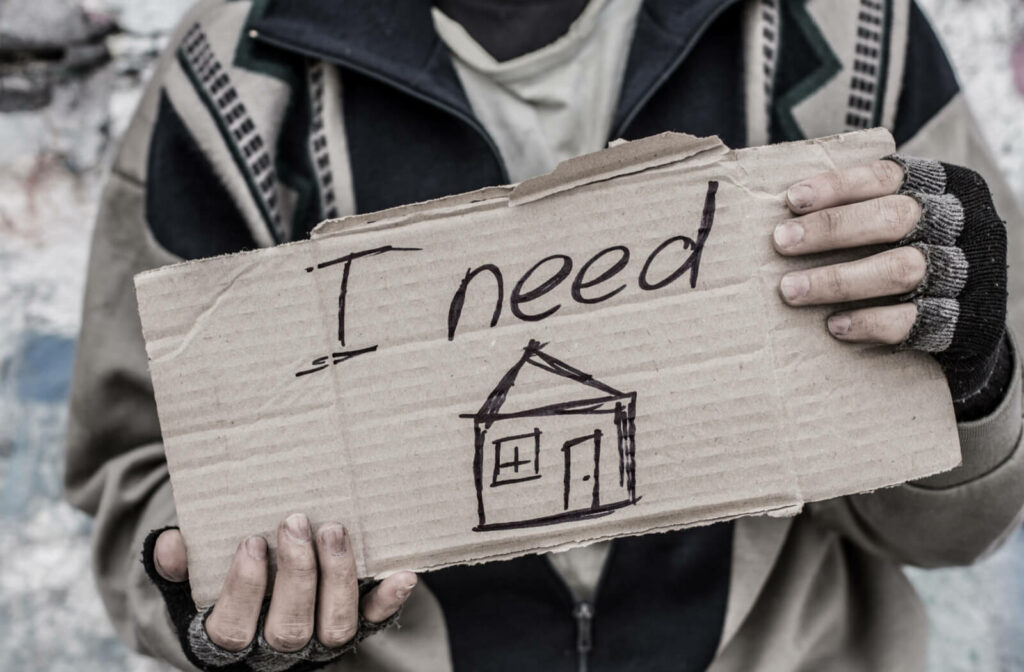Homelessness impacts thousands of Canadians, who face discrimination, social exclusion, and lack of essential care. When discussing homelessness, the individuals experiencing this may have several terms used to describe them. Homeless, unhoused, and person experiencing homelessness are different terms used today, but what is the difference between them?
Continue reading to learn more about the difference between these terms and the best ones to use when discussing homelessness.
People Experiencing Homelessness vs. Unhoused vs. Homeless: The Difference Between Them
People experiencing homelessness, unhoused, and homeless all mean the same thing, a person lacking consistent shelter. However, the way you describe this situation matters.
“Homeless people” is a common way to describe someone experiencing homelessness, but it has negative connotations—it summarizes the entire homeless experience in a few words. “Unhoused” is an alternative, potentially more positive, way to say someone is experiencing homelessness, but it focuses on a person’s lack of shelter.
Using the term “people experiencing homelessness” focuses on the experience someone is going through rather than defining them as that experience. This experience is more than a lack of housing—according to the Canadian Observatory on Homelessness, it is a negative, unpleasant, unhealthy, unsafe, stressful, and distressing experience.
People Experiencing Homelessness Face More Than a Lack of Housing
A definition of homelessness set by the United Nations states that you cannot capture the experience of homelessness “without a richer definition that goes beyond the deprivation of physical shelter. Reducing the matter to putting a roof over one’s head, would fail to take into account the loss of social connection—the feeling of ‘belonging nowhere’—and the social exclusion experienced by persons living in homelessness.”
Homelessness is much more than simply not having regular shelter, and defining someone as a “homeless person” ignores the other aspects of this problem. It’s common for someone experiencing homelessness to be discriminated against due to their current situation.
Many people experiencing homelessness are banned or restricted from public and private areas others are allowed to experience, such as public parks, streets, restaurants, stores, malls, and more. Combined with other discrimination based on race, sexual orientation, mental illness, age, and other factors, many people experiencing homelessness are often seen as lesser than others.
Undesired, potentially dangerous environments may be some of the only areas people experiencing homelessness can stay in, putting them at risk of health problems. Many aspects of homelessness can affect general health, including:
- Limited, if any, access to healthcare
- Food scarcity
- Unsafe environments
- Violence
- Poor living conditions
- Severe weather
Anyone Can Experience Homelessness
It can be common to treat people experiencing homelessness as outliers in the world—people don’t have a home because of their own faults, mistakes, or laziness. However, anyone can become homeless for various reasons, including:
- Economic & societal issues
- Poverty
- Housing shortage
- System failures
- Personal circumstances
- Relationship problems
- Domestic violence
While anyone can experience homelessness, it’s important to note that marginalized populations (Indigenous peoples, racialized communities, LGBTQIA2S+, people with disabilities) can be more likely to experience homelessness.
Why Say People Experiencing Homelessness?
Saying “people experiencing homelessness” is a more respectful way to discuss the situation of homelessness. It avoids putting groups of people together by the one common aspect of their lives (experiencing homelessness) and acknowledges them as unique individuals.
When discussing homelessness, person-first language is important.
The Importance of Person-First Language
Person-first language emphasizes a person by seeing them as a unique individual, not a disability, disease, or experience. It follows the idea that a disability or experience is not the defining trait of a person.
Person-first language is common when discussing someone living with a disease or illness (for example saying “someone who has diabetes,” rather than “a diabetic”). This same level of respect applies to someone experiencing homelessness.
When discussing the issue of homelessness, you can show respect and empathy to those affected by referring to them as someone who experiences homelessness.
What Can You Do to Help Combat Homelessness?
While person-first language is important when discussing homelessness, other actions are necessary to help combat this nationwide problem. While homelessness can seem like too big of a problem to handle alone, you can make an impact in your local community. There are many ways to help fight homelessness.
Some ways you can get involved in your community include:
There is always a way to help those in need. Contact us today if you’re looking to help make a difference in your community.



